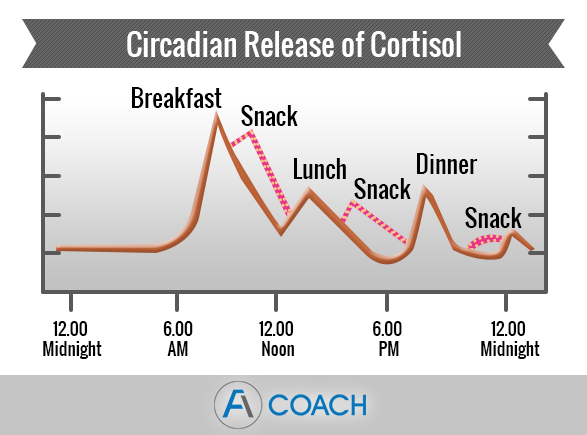July 23rd, 2017 •
Comments Off on Why Adrenal Fatigue Might Be Making You Fat

Obesity is a growing problem all over the world, with figures from the World Health Organization revealing that more than 600 million people are now obese – or around 13% of all adults.
A combination of unhealthy lifestyles and the rise in consumption of processed convenience foods have caused obesity to grow to epidemic levels. But one thing to also consider is the link between weight gain, weight loss resistance and adrenal fatigue. If you find it difficult to shed those excess pounds, it just might be stress that’s the cause of your problems…
Stress and the Fight-or-Flight Response
One explanation of why people with adrenal fatigue often struggle with their weight can be found in the fight-or-flight response (sometimes called the acute stress response).
In times gone by, the fight-or-flight response was critical to our human survival – but in the modern world it’s more likely to be triggered by “psychological stressors” instead of “physical stress”. Examples are noisy neighbours, traffic jams, skipping meals, a deadline at work or financial worries. Quite simply, the body is unable to distinguish between a perceived threat and a real threat.
During the fight-or-flight response, you will experience many physiological changes, including an increased heart rate, a rise in blood pressure and dilation of the pupils.
Crucially, the body also temporarily shuts down the digestive system so that it can redirect blood to other parts of the body. When you are under stress, the adrenal glands produce high levels of cortisol, which mobilize fat and carbohydrates to provide the body with the energy and increased blood sugar it needs to gain the strength and energy to fight off the “threat”.
When adrenaline kicks in, you will initially feel less hungry as your blood flows to the muscles in your body. However, once the stressful situation is over and the effects of adrenaline have lapsed, cortisol continues to stay in your blood. At this time, you may notice an increase in appetite as cortisol signals to your body to restore the energy you used up during the fight-or-flight response.
If you have adrenal fatigue and feel in a near-constant state of stress, the big problem is that the fight-or-flight response is activated many times during the day. This leaves your body unable to properly regulate cortisol levels.
When you are stressed, there can be a big temptation to reach for junk food. This is because these energy-dense foods provide a combination of high calories, fat and sugar. Unfortunately, these foods actually further add to your stress levels and may cause weight gain. Instead, the best thing you can do is to eat a healthy snack and get some (light) exercise, which helps to get rid of cortisol in your system and leaves you feeling much more relaxed.
Stress and a Lack of Sleep
Many people who suffer from adrenal fatigue find it difficult to get a good night’s sleep. When you feel stressed, it can be almost impossible to relax and “switch off” from your worries. We’ve all experienced those nights where you just cannot get to sleep – no matter how hard you try!
Unfortunately, a lack of sleep can also disrupt the chemicals that regulate appetite. Leptin is a chemical that normally signals our brain when we are full. It also tells the body when it should start burning up calories and when it should create energy for our body to use. When we are asleep, leptin levels increase. But when we don’t get enough sleep we end up with too little leptin in our body. A decrease in leptin as a result of sleep deprivation can lead to a constant feeling of hunger and an overall slow-down of our metabolism.
Another hormone that is linked to sleep and weight is ghrelin. Ghrelin basically does the exact opposite of leptin. It tells our brain when we should eat, when our body should stop burning calories and when it should store energy as fat. When we are asleep ghrelin levels decrease. So when we don’t sleep enough we end up with too much ghrelin in our body. Then our body thinks it is hungry, it needs more calories and stops burning calories because it thinks there is a shortage. After a bad night’s sleep, we also often crave carbs to give us the ‘boost’ we think we need.
If you suffer from adrenal fatigue and want to lose weight, one of the best things you can do is take steps to improve the quality of sleep you get each night. To begin with, avoid caffeine before going to bed, and make sure you keep those electronic devices well away from the bedroom.
Stress and Comfort Food
When we suffer from stress, we often crave comfort foods to make ourselves feel better. If we give in to this self-medicating behavior, over time we train ourselves to alleviate the pain of stress by eating foods that are high in sugar, salt and fat. Which ultimately leaves us feeling worse than we did before!
In addition, it’s worth mentioning coffee and the reason why you should try to avoid it as much as possible if you want to keep your weight down. While your morning coffee might give you a temporary energy boost, caffeine is known to increase cortisol levels and boost your appetite.
Conclusion
As we have seen, stress can have a big impact on your weight and your ability to control it. If you suffer from adrenal fatigue and want to shed those excess pounds, you should try to exercise regularly, eat well and get a good night’s sleep. Get the basics right and it can certainly make a big difference.












